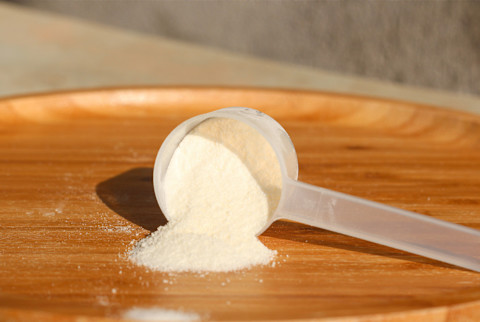Does Collagen Expire? Here's How To Make Sure Yours Stays Fresh

The whole point of a daily collagen routine is to consume those hydrolyzed collagen peptides, well, daily. To reap the skin benefits, research suggests you should stick with it for at least three months—and that's assuming you abide by a regular ritual.* Considering most collagen powders contain 20 to 30 servings, you might breeze through the formula rather quickly. Scoop after scoop, you stir it into your coffee, smoothie, oatmeal, and—poof!—it's gone in a month or so, and you're on to the next bag.
But just in case you have an extra product tucked away in your cabinet, you may be wondering: Does collagen expire? Could you technically consume it past its use-by date? The answer (like many collagen-related questions) isn't so simple, as your storage habits are everything. Below, we break down the supplement's shelf-life and how to make sure yours stays fresh.
Does collagen expire?
To put it simply: Yes, collagen expires. Vitamins and supplements are not meant to last forever—and collagen is no exception to this rule.
The timing, however, can vary depending on the formula: According to mbg's vice president of scientific affairs Ashley Jordan Ferira, Ph.D., RDN, it's best to toss your collagen powder after two years, unless there's a specific expiration date on the label that says otherwise. "In reality, many supplement ingredients carry shelf lives of three years plus, including collagen peptides. I've seen five-year shelf lives listed on collagen peptide raw material specifications before," she notes. But two years is a good general rule of thumb.
However, if a product folds in antioxidant-rich ingredients (like vitamins C and E, etc.), the product may be able to get away with a longer shelf life. See, antioxidants protect against oxidation (hence anti and oxidant), which can help buffer a formula from degrading over time. "It's like a natural preservation system, thanks to the power of antioxidants," says Ferira. Of course, that's not the only reason we formulated our beauty & gut collagen+ with these antioxidants—vitamin C is a vital part of the collagen production process, and vitamin E all help protect the skin from photoaging—but they do extend the shelf life some.* Consider it a bonus perk.
As we mentioned above, people who adopt a regular collagen routine won't likely run into any expiration issues (in fact, they'll probably run through product after product rather quickly). However, if you do notice some sensorial changes with the powder, it might be time to toss it. "That could involve clumping of powder or very noticeable changes in color, smell, or taste," notes Ferira.
How to make sure yours stays fresh.
Generally, ingredients in supplement powders or liquids are slightly more exposed to degradation than those that come in tablet, capsule, or softgel/gelcap delivery forms. That's because "tablets, capsules, and softgels pack in or enclose the ingredients, while powder and liquid delivery formats simply have more exposed surface area by design," says Ferira. Meaning, powders are more vulnerable to the surrounding environment, which can influence its shelf life—which makes your storage choices crucial for keeping your collagen fresh.
Heat, light, moisture, humidity, and bacteria can all affect the quality of your collagen powder over time, just like they can make your skin care topicals go rancid. That said, Ferira recommends these storage and usage tips:
- Keep your collagen powder in a cool, dry area, ideally in a kitchen cabinet away from light. "Avoid the bathroom (not sure what your collagen would be doing in there anyway...) and anywhere near the heat of the stove and dishwasher or direct heat from windows," she says.
- Make sure you remove excess air and tightly seal the packaging after each use to limit air exposure.
- Wash your hands before using the collagen powder, and always use a spoon or scoop to avoid introducing bacteria into the formula.
- Opt for collagen powders in opaque or dark packaging to protect the formula from light.
The takeaway.
You may pay less attention to expiration dates on your vitamins and supplements (as opposed to, say, food), but it's important to toss a product past its shelf-life. That said, please toss your collagen powder after its use-by date or if there's anything funky going on with the smell, taste, or texture. It's not a common issue, as you'll likely finish the formula long before it's past its prime (otherwise, what's the point of a regular collagen routine?), but the way you store your supplement can certainly speed things along.

